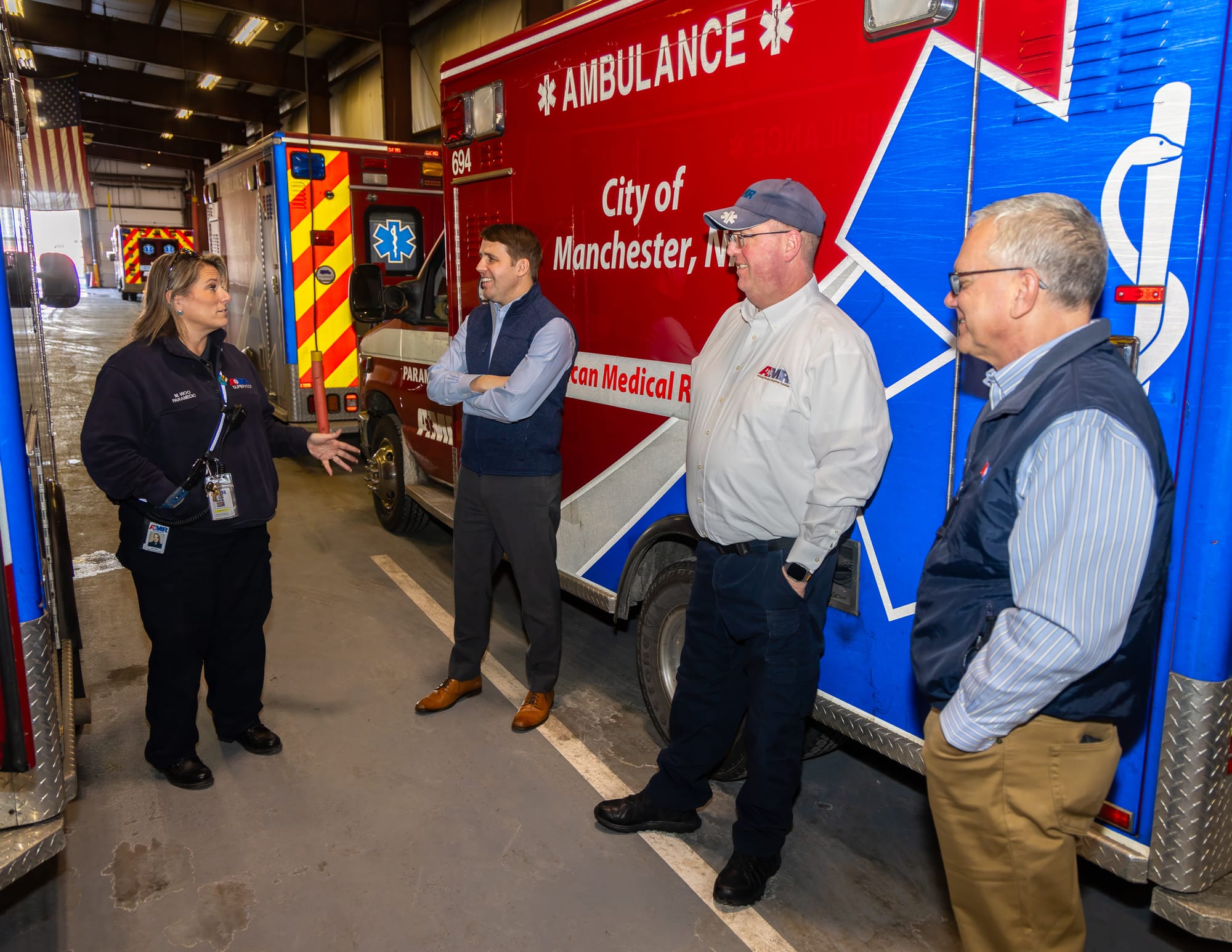Pappas meets with the AMR team on the frontline of the New Hampshire opioid crisis
The team of EMTs described the challenges they encounter daily meeting the emergency medical needs of the city. The combination of drug addiction, mental health, homelessness, and access to healthcare combined create a perfect storm of demand that they constantly contend with. They are on the front


MANCHESTER, NH – U.S. Congressman Chris Pappas (NH-02) on Jan. 27 visited with the team at American Medical Response (AMR) in his hometown of Manchester. AMR provides emergency medical and ambulance services for Manchester, Nashua, Portsmouth, and throughout the state. The purpose of the visit was to tour the facility and to hold a discussion about ongoing efforts to combat the fentanyl and addiction epidemic.
Chris Stawasz, Regional Director of Government Affairs, along with supervisors and the team of medics gathered to talk with Pappas about their role in dealing with the addiction crisis and other issues in the city.
“He’s always kept us up-to-date in terms of data and he shares with us the latest information of what you all are seeing through your work. But I think statistics are one thing, but what you live each and every day is something incredibly different,” said Pappas, of Stawaz. “I just wanted to have the opportunity to come by and hear from you and come here and see what you do on a day-to-day basis. We know when we talk about substance misuse, overdose deaths, and mental health challenges, this is obviously a national crisis, but it’s a very local and personal issue.”
The team of EMTs described the challenges they encounter daily meeting the emergency medical needs of the city. The combination of drug addiction, mental health, homelessness, and access to healthcare combined create a perfect storm of demand that they constantly contend with. They are on the front lines of these issues.
EMT Katlyn Laplante acknowledging the complexity of the situation offered this insight: “ Yes, we have a large drug issue, but there’s a core issue with homelessness. You’re not going to fix that drug issue until we start to address homelessness. There are not enough shelters right now, and we’re shutting down some of them. They’re so overwhelmed with people. You can’t imagine living on the street in 2-degree weather, trying to fix that drug problem. It’s bad. “
Jason Preston gave the example of how the lack of medical rehab beds and limits to home follow-up care increase health problems and ultimately costs. He offered an anecdote about a gentleman who required a hip replacement, saying, “He got sent to his home which was not set up well with no room to use a walker and he fell and rebroke his hip. He got sent home because of the lack of rehab beds.”
Chris Stawasz discussed a pilot program that provided mobile integrated healthcare out to people’s homes as a potential solution.
“I think it was very successful in proving that the model is that these folks (EMTs) are out and able to see people in their home environment that oftentimes a physician can’t put eyes on, and they have a much better understanding of what their challenges are,” said Stawasz, adding that the program had since ended.
The other issue of adapting their role in the healthcare system is how AMR is paid.
“The other piece is that Medicare doesn’t incentivize us to not take someone to the hospital. The only way that we can fund our system is if we take you to the hospital. We receive zero dollars for going out and checking your blood pressure or waking you up from a diabetic problem or things like that. There’s no treatment methodology in place,” said Stawasz.
There has been some improvement in the opioid crisis. AMR reports that their medics responded to a total of 38 suspected opioid overdoses in Nashua and Manchester during December 2024; 27 in Manchester and 11 in Nashua. That is the lowest one-month suspected opioid OD response total in nearly 5 years.
In 2024 suspected opioid overdoses and deaths were significantly lower in both Nashua & Manchester. Nashua recorded both the lowest number of suspected opioid ODs in one year and the lowest number of suspected opioid deaths in one year since AMR began tracking them in 2015.
- Manchester recorded 24% fewer suspected opioid overdoses in 2024 than in 2023
- Nashua recorded 19% fewer suspected opioid overdoses in 2024 than in 2023
- Manchester recorded 21% fewer suspected opioid deaths in 2024 than in 2023
- Nashua recorded 49% fewer suspected opioid deaths in 2024 than in 2023.
Dispatch calls over the loudspeaker punctuated the conversation with Congressman Pappas. With each one, a pair of medics quickly rose and headed out to face the call. The demands of the job and their services are never-ending.





